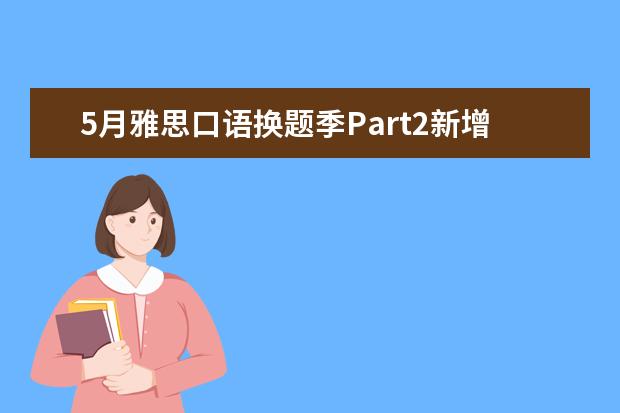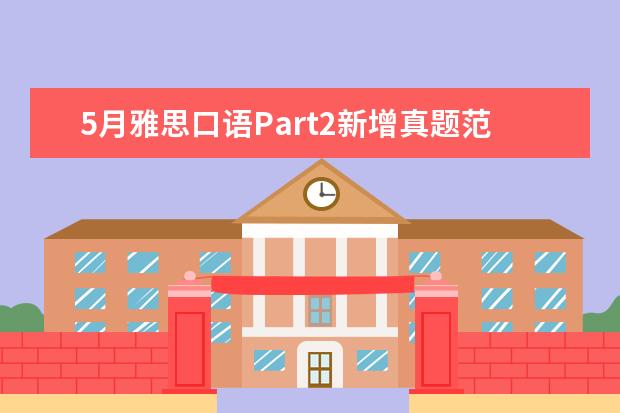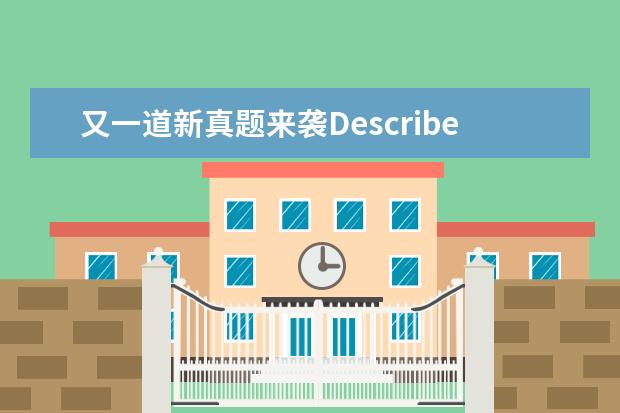当前城市:淄博[切换]
- 手机雅思无忧

扫码登录
雅思考试主要是通过对考生听、说、读、写四个方面英语能力的考核,综合测评考生的英语沟通运用能力,实现“沟通为本”的考试理念。对于雅思考生来说,也有很多考试难点和政策盲区需要帮助解答。今天雅思无忧网小编准备了5月雅思口语换题季Part2新增真题范文及语料:Describe 【雅思口语必背真题】口语考官最爱的120个问题,希望通过文章来解决雅思考生这方面的疑难问题,敬请关注。
5月份是雅思口语的换题季,题库中又多了一些考试题目,所以,频道第一时间为大家带来2021年5~8月雅思口语题库中的新增题目的范文以及语料,赶快来看一下吧!今天为大家带来的Part2题目是:Describe a leader who you admire
You should say:
Who the person is
What this person did (has done) that you admire
How you know this person or know about this person
And explain how this leader’s qualities impressed you
范文1:
Let me talk about the late Mr.Deng Xiaoping. He was just average in terms of appearance, except that his sparking eyes showed this must be a super intelligent gentleman. As far as I know, he joined a “work study” program in France when he was young and learned a lot of new ideas about social development. Then he returned to China and which was vastly different from most of other leaders’ back then. Some of his ideas even landed him in jail. But he never gave up and he never stopped learning throughout the years. Deng rose back to power again in the late 1970s.From then on, he used his knowledge and experience to finally become one of the most powerful men in China . His great thinking was obvious when he said, “To get rich is glorious.” , which was , at that time , so different from all the other political thoughts in China. Deng gave a billion people the chance to lift themselves out of poverty and showed us that a lot could actually be learned from studying other cultures. I admire Deng coz he was wise and successful. And most importantly, he showed us we should be tough and hold on to our own beliefs even when others laughed at us…
范文2:
The person whom I admired first time is my mother. But, if we talk about the famous leader, I can say that, he is Mahatma Gandhi. He was from India. He is known as the “Father of nation” in India as he played a very important role in gaining the freedom of India.
Mahatma Gandhi gave the Indian People not only freedom but also the new thoughts on non-violence and sustainable living. There are some qualities about him like trust, non-violence, legacy, etc. These qualities are the ones that inspired me. He said that “If my faith burns bright as I hope it will even if I start alone, I shall be alive in grave and what is more speaking from it”.
Mahatma Gandhi was born on October 2, 1869 in *all town named Porbander.
Gandhi was a lawyer and he became the leader of the Indian National Congress.
The main things that admire me about him are that he was a great follower of
non-violence. The other thing, which inspired me, is his punctuality. He was
very prompt in his life as he believes that punctuality is very important in the
life. I think we all should be punctual in the life.
想知道考官会问什么问题吗?本文汇集了IELTS雅思口语考官最常问的120个问题,以供考生们参考。记住,只有经过自己思考后的答案才可以引起考官的注意。
1. What's your name?
2. Does your name have any special meaning?
3. Where were you come from?
4. What kind of landscape surrounds your hometown?
5. What is the main crop in your hometown?
6. What is the difference between Beijing and your hometown?
7. What are the main places of interest in your hometown?
8. What is the climate like in your hometown?
9. What is the character of the people like in the region where you live?
10. What are the differences in accent between the people of your hometown and Beijing?
11. What is people"s favorite food in your region?
12. How do you make dumplings?
13. What do you do during the Spring Festival?
14. Why is the Spring Festival so important to Chinese people?
15. Can you describe one of the main festivals celebrated in your country?
16. Tell me something about the Lantern Festival.
17. Tell me something about the Qing Ming Festival.
18. Tell me something about the customs of your country.
19. How long have you lived in Beijing?
20. What is the weather like in Beijing?
21. How do you compare the climate in Beijing with that in your hometown?
22. What place in Beijing do you like best? Why ?
23. Which is the worst place you"ve been to China?
24. Which is the best place you"ve been to China?
25. What places in Beijing should a foreigner visit? Why?
26. What are the major social problems in Beijing? How can they be solved?
27. What is the biggest problem China faces?
28. What places in Beijing should a foreigner visit? Why?
29. Could you tell me something about your family?
30. Have you any children?
31. What is your child"s name? Does his name have a meaning?
32. What does your wife/hu*and do?
33. When did you get married?
34. Describe your wedding.
35. How have weddings changed in recent years?
36. Are there any special customs about wedding in your region?
37. Describe a traditional wedding ceremony.
38. Where did you go for your honeymoon?
39. Did you have to ask for permission from your parents before you got married?
40. Is it acceptable for couples to live together without marrying?
41. Where do you think a newly couple should live? Living with their parents or on their own?
42. What responsibilities should a couple take?
43. How do Chinese usually celebrate birthdays?
44. Are there any traditions concerning the birth of a baby?
45. What kind of parent do you intend to be?
46. What do you think of One-Child Policy in China?
47. Why do people in China traditionally want to have a son?
48. What difficulties do Chinese farmers have concerning their old age?
49. What do you think needs to be done in order to relieve the farmer"s worries?
50. What hope or fears do you have for your children?
51. What sort of culture do you hope your child will grow up in?
52. Are you going to bring up your child differently from the way you were brought up? How?
53. Do you enjoy shopping?
54. Who does most of the shopping in your family?
55. What are you good at cooking? What is your favorite dish?
56. Who does most of cooking in your family?
57. Is there *** discrimination in China?
58. How do you sum up women"s conditions in China?
59. What are the causes of *** discrimination?
60. Should government pay certain salaries to those housewives? Why or why not?
61. Would you want your wife to continue with her career or to stay at home taking care of the household after you get married?
62. Have you ever wished to be one of the opposite ***? Why (why not)?
63. What would you do if your next-door neighbour were noisy nearly all the time?
64. Do you have a lot of friend?
65. What does friendship mean to you? What kind of people do you make friend with?
66. What is your major?
67. How do you like your major?
68. When and where did you graduate? What qualifications have you obtained?
69. Do you still remember your school days?
70. What impressed you most when you were at university?
71. Which is the best university in your country?
72. Could you sum up your own study habits in a few points?
73. What do you think of the practice of setting up key schools in primary and secondary school education in China?
74. Do you think the subjects you are studying today are relevant to present-day society? Why ?
75. What do you think education should be? Should it be a process of learning what is useful for your future life or should it be simply learning for enjoyment? Why?
76. What do you do for a living?
77. What do you do in the office every day?
78. Since your job seems too professional to me, could you explain it in detail?
79. What are your job prospects?
80. If you had the opportunity to change your job, what would you do with it?
81. Do you have any ambitious?
82. Will any possible future changes affect your job in any way?
83. What are your spare time interests?
84. How do you spend your weekends?
85. What is your favorite sport? What are the rules?
86. What is the most popular sport in your country?
87. What are the sporting facilities like in your university/Beijing?
88. What do you know about Qigong? Do you believe in Qigong?
89. What do you do in your spare time?
90. Do you often read newspapers? If not, why ones do you read?
91. What do you think of computer?
92. Do you think computer has changed our life so much?
93. Do you often go to the cinema/theatre?
94. What kind of films do you like best?
95. Do you often watch TV? What is your favorite program?
96. Do you think watching TV too much is a waste of time?
97. What kind of music do you enjoy?
98. Who is your favorite film star? Will you describe him/her to me?
99. Do you enjoy travelling?
100. Where have you been travelling to? Which place interested you most?
101. Do you *oking?
102. Do you think *oking is a problem that needs special attention and has to be solved? If so, why?
103. What do you know about ABC?
104. What problem do you think you will have in ABC?
105. How will you overcome the difficulties?
106. Do you think you will be able to cope with English-demands of your intended study program in ABC?
107. What difficulties do you think you’ll encounter in your studies in ABC?
108. Can you imagine what life in Britain/Canada/Australia/London, etc. would be like?
109. How will you fare in Britain/Canada/Australia, etc. without your family?
110. What do you intend to study?
111. Which university are you going to study at?
112. Why did you choose this university?
113. Where are you going to study in ABC?
114. What are you plans in ABC?
115. What is your research proposal all about?
116. What do you hope for most from your study abroad?
117. Will your study abroad help your job prospects after come back to China?
118. Should you study more theory or do more practice? Give your reasons, please.
119. What kind of differences in the cultures are you expecting between China and the ABC?
120. How will your study in Britain benefit your work in China when you come back to China?
121. What do you intend to do after you finish studying?
122. What will be your main problem when you are study in a foreign country?
123. What problem can you foresee in the future when you come back to China?
124. Will there be any adjustment problems in your life when you come back to China? If so, what are they?
125. Will you have to make any changes in your work/life when you come back to China?
126. Do you think there will be a gap between your knowledge gained in China and the level of knowledge you are going to encounter on arrival? If so, what will it be?
127. What do you think of the future of China keeps an open policy?
128. What do you regard as the most significant events in your country’s recent history?
129. Are there any special places you want to see in Canada? What are they?
130. What do you especially want to do in Canada?
131. How do you like your life in ABC University?
132. What do you think of the training in the university?
133. In what way do you think university training is helpful or falls short?
134. What aspect of English do you find the most difficult?
135. Do you find American English easier to understand than Britain English?
136. What sports are played in your country?
137. Could you describe the traditional architecture of your country?
138. What role dose religion play in everyday life in your country?
139. What would you regard as the most significant events in your country"s recent history?
140. How aware do you think people are nowadays about environmental issues?
141. Could you tell me why you chose to study at the university of ABC?
142. What role dose touri* play in your country"s economy?
143. How serious is unemployment in your country?
144. In your opinion, what are the most serious problems associated with modern life?
145. What do you think have been the most important changes in your field over the past 5 years?
146. What are you going to major in ?
147. Are you going to do your own cooking when you are at university?
148. Some local students feel that overseas students get preferential treatment. What is your opinion?
149. Do you think you will be able to cope with the English-language demands of your intended program?
150. What do you think are the main causes of road accidents?
151. Do you think the government is doing enough to prevent road accidents?
152. As there are more and more private cars, what do you think the government should do in order to encourage citizens to use public transport?
153. How do you see yourself in ten years" time?
154. Have you ever thought to have your own business?
155. What business do you hope to have?
156. Do you know about any policies about opening a business abroad?
157. What are your plans for your future?
158. Why do you think there are more and more people leaving to immigrate to other countries?
159. Is it good for China that so many people are going to other countries?
160. Will your life change a lot after you immigrate to ABC?
161. What will you do if you are ill abroad?
162. Do you know what to do in case of emergency?
163. What will do if you cannot find a job in ABC?
164. Why do you want to immigrate to ABC?
165. What will you do after the IELTS test?
166. What will do if you fail the IELTS test?
167. What"s your dream job?
168. How long have you been learning English?
169. What troubles you most at the moment?
170. Does your family support your decision on going ABC? What help do they offer?
以上就是最常考的170个问题~考生们可以针对以上的问题想想自己会如何回答,希望能对大家有所帮助。
以上就是雅思无忧网为您准备的访问雅思无忧网(https://www.yasi.cn/),了解更多雅思考试新消息,新动态。
雅思培训 5月雅思口语Part2新增真题范文:Describe 【雅思口语必背真题】口语考官最爱的120个问题
5月雅思口语Part2新增真题范文:Describe 【雅思口语必背真题】口语考官最爱的120个问题
雅思考试主要是通过对考生听、说、读、写四个方面英语能力的考核,综合测评考生的英语沟通运用能力,实现“
2023年04月03日 12:12 5月雅思口语换题季Part2新增真题范文及语料:Describe 【雅思口语必背真题】口语考官最爱的120个问题
5月雅思口语换题季Part2新增真题范文及语料:Describe 【雅思口语必背真题】口语考官最爱的120个问题
雅思考试主要是通过对考生听、说、读、写四个方面英语能力的考核,综合测评考生的英语沟通运用能力,实现“
2023年04月04日 06:12 5月雅思口语Part2新增真题范文及语料:Describe 【雅思口语必背真题】口语考官最爱的120个问题
5月雅思口语Part2新增真题范文及语料:Describe 【雅思口语必背真题】口语考官最爱的120个问题
雅思考试主要是通过对考生听、说、读、写四个方面英语能力的考核,综合测评考生的英语沟通运用能力,实现“
2023年04月04日 17:12 雅思口语Part2新增真题范文及语料:Describe 【雅思口语必背真题】口语考官最爱的120个问题
雅思口语Part2新增真题范文及语料:Describe 【雅思口语必背真题】口语考官最爱的120个问题
雅思考试主要是通过对考生听、说、读、写四个方面英语能力的考核,综合测评考生的英语沟通运用能力,实现“
2023年04月07日 05:09 5月雅思口语换题季Part2新增真题范文及语料:Describe 【雅思口语必背真题】口语考官最爱的120个问题
5月雅思口语换题季Part2新增真题范文及语料:Describe 【雅思口语必背真题】口语考官最爱的120个问题
雅思考试主要是通过对考生听、说、读、写四个方面英语能力的考核,综合测评考生的英语沟通运用能力,实现“
2023年04月13日 02:51 5月雅思口语换题季Part2新增真题范文及语料:Describe 【雅思口语必背真题】口语考官最爱的120个问题
5月雅思口语换题季Part2新增真题范文及语料:Describe 【雅思口语必背真题】口语考官最爱的120个问题
雅思考试主要是通过对考生听、说、读、写四个方面英语能力的考核,综合测评考生的英语沟通运用能力,实现“
2023年04月14日 17:51 5月雅思口语Part2新增真题范文及语料:Describe 【雅思口语必背真题】口语考官最爱的120个问题
5月雅思口语Part2新增真题范文及语料:Describe 【雅思口语必背真题】口语考官最爱的120个问题
雅思考试主要是通过对考生听、说、读、写四个方面英语能力的考核,综合测评考生的英语沟通运用能力,实现“
2023年04月16日 07:24 雅思口语Part2新增真题范文及语料:Describe 【雅思口语必背真题】口语考官最爱的120个问题
雅思口语Part2新增真题范文及语料:Describe 【雅思口语必背真题】口语考官最爱的120个问题
雅思考试主要是通过对考生听、说、读、写四个方面英语能力的考核,综合测评考生的英语沟通运用能力,实现“
2023年04月20日 10:03 又一道新真题来袭Describe 【雅思口语必背真题】口语考官最爱的120个问题
又一道新真题来袭Describe 【雅思口语必背真题】口语考官最爱的120个问题
雅思考试主要是通过对考生听、说、读、写四个方面英语能力的考核,综合测评考生的英语沟通运用能力,实现“
2023年04月07日 00:33 雅思口语Part2部分真题更新总结 【雅思口语必背真题】口语考官最爱的120个问题
雅思口语Part2部分真题更新总结 【雅思口语必背真题】口语考官最爱的120个问题
雅思考试主要是通过对考生听、说、读、写四个方面英语能力的考核,综合测评考生的英语沟通运用能力,实现“
2023年04月26日 11:42